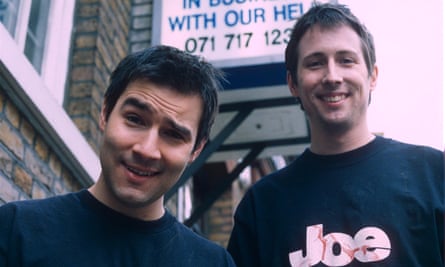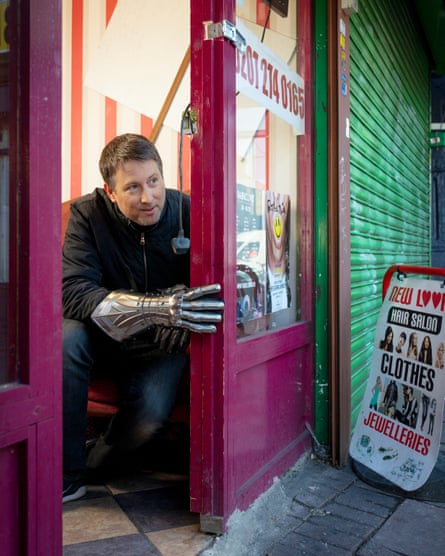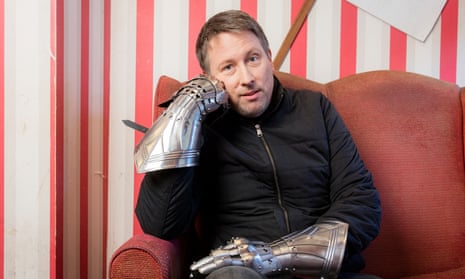Joe Cornish, sitting in front of a pair of silver gauntlets, is ready for war. He almost brought more weaponry, he says. “But I was worried about being at large in Brixton with a huge sword.”
We are at Cornish’s local cafe, a place in Brixton, south London, that serves towers of pancakes, and whose owner knows him by name. Cornish is here to promote his film The Kid Who Would Be King, an epic adventure about a boy who finds King Arthur’s legendary sword, Excalibur. “It’s got an army of kids in armour fighting giant winged demons and stuff,” he says, with wide-eyed enthusiasm.
Now 50, Cornish has been a legitimate film-maker since 2011’s alien invasion comedy Attack the Block, which brought him – and star John Boyega – to the attention of Hollywood. But for many, his image is frozen in time: mid-20s, baggy T-shirt, face like a Quentin Blake scribble and perched on the edge of a bed next to his best friend and comedy partner, Adam Buxton. Today, he’s a reassuring mix of both personas – prone to silly giggles, yet dressed in a director-type padded jacket, trim and sober (he doesn’t drink or smoke any more, coffee is probably off the menu, too).
We meet a week after the film’s release in the US, and a day or two after an article in Variety discusses its disappointing debut and calls it “one of the year’s first big-budget flops”. A possible $50m (£39m) loss is mentioned.
Cornish is braced – and optimistic. “I think it’s a miracle that it got made. And I feel really grateful and proud that it got made. And that people are seeing it and that reactions, critically and from audiences, are good. I can’t complain about anything. It’s a real anomaly.”
The film’s demographic is unique. Created primarily for children and starring young actors, many of whom are unknown, it has very little of the multi-generational wit and few of the cultural references of other, savvier film-makers.
“I guess superhero movies have started to work for both children and adults in a slightly troubling way,” he says. “There’s something a bit healthy about having something just for children. It’s not the same period in your life and in your mind. It shouldn’t be, should it?”
Cornish and his partner don’t have children. “I suppose both movies are a sort of way to have children for a bit,” he says. “To borrow them and then give them back.” The films also hark back to his formative years going solo to the cinema in Streatham, south London, during a time when “there were fantastic movies made for children, starring children”.
As well as being filled with classic fantasy scenes – a witchy woman who lives in a tree, demons on horseback – the film invites more sober parallels to contemporary Britain. The stakes are high: if its child protagonists can fight off evil, they will unite “a nation divided” and thwart men inflicted by “greed, entitlement and vengefulness”.
But Brexit analogies were unintentional. The central idea of the film came to Cornish decades ago, when he was obsessed with both ET and the thought of having a sacred fantasy object that he had to preserve. If anything, the subtext concerns growing up and accepting life’s hardships. Its cherubic lead – played by Andy Serkis’s son, Louis – uncovers dark truths about his family and must confront school bullies. Given this focus – plus the fact a 12-year-old Cornish carried a cardboard cutout of ET with him everywhere he went – I wonder if he had a rough time at school?
He nods wryly. “I was a day boy in my boarding school and I used to keep all my books in a little padlocked cupboard, but quite early on I got pushed into it by a kid called Conrad, and he padlocked me in. It made me late for class and I got very anxious because I knew it meant I’d have to kick my way out and destroy school property. Plus, my legs were very weak.” He smiles. In his looming adult form, at least, Cornish could confidently destroy a book cupboard from within using only his pins.
Being an underdog was always a key part of Cornish’s appeal with Buxton. The DIY charm of the Adam and Joe Show and their XFM and BBC 6 Music radio programmes made them heroes of counter-culture. On late-night Channel 4 in the mid 90s, they were the antithesis of the hyper-energised lads found on shows such as The Word and The Big Breakfast. They also picked up something of a slacker reputation, once dubbed “Britain’s foremost couch potatoes” by Dermot O’Leary.
Did this go down well with Cornish’s parents, I wonder? The ones who paid the fees for him to attend Westminster school, and sat through countless “terrible short films”.

His father’s tactic, says Cornish, was to address his opprobrium to the cat. “He used to walk past me and say: ‘Oh, get a job.’ To the cat. I’d think, well that’s just aimed at me, isn’t it? He may well have been talking to the cat, who did not have a job and was still living at home, as was I.”
Cornish’s first job was as a runner on Blue Juice – a British surfing movie starring Ewan McGregor and Catherine Zeta-Jones – but his first break he credits “almost entirely” to Buxton, who brought Cornish onboard as co-host on the home video clip show Takeover TV. The pair then had their own baby commissioned: The Adam and Joe Show, which ran from 1996 to 2001. After that they went on to host a show on XFM, then 6 Music, before pursuing separate ventures.
Fans would have reason to question the relationship between the two over recent years. Cornish headed to Hollywood, cameoed in Star Wars and schmoozed with Tom Cruise. Buxton built a lower-key but devoted homegrown following with his excellent solo podcast, on which Cornish has appeared as a guest, regaling the clenched-jawed host with tales of Tinseltown. Yet the dynamic seems to have mellowed of late, as their profiles have achieved some sort of parity.
Also in their year at Westminster, it turns out, was Louis Theroux (two years their junior, but moved up because he was so clever). Were they always competitive, I wonder?
He nods. “It was very competitive between Adam and me for a bit in a quite an unhealthy way, but we managed to grow beyond that. I always remember being with Adam and Louis on a holiday and around the time of the Waco Siege and David Koresh.
“Louis looked very much like Koresh and Adam and I wanted to film a spoof interview with him, and Louis did it in the end, but he was very resistant. I always think he knew that someday it might be bad to have video footage of him pretending to be David Koresh. And also when we put on Bugsy Malone at school, Adam was Fat Sam. He didn’t want to be called Fat Sam, it was Slightly Overweight Sam, and Louis was very stubborn about being in it. He eventually took a small part.”

His brow furrows as he sips his apple juice. “We were competitive, in a good way.”
As for the future, Cornish plans to make more films, saying that the eight-year gap between debut and followup was a case of a lack of confidence, rather than an absence of opportunity. He was recruited as a writer for tentpole productions such as Ant-Man and Spielberg’s Tintin film, but links to other blockbusters such as Star Trek 3 and Die Hard 4 were just loose ends.
“I did get offered or approached about those movies and it was very flattering and I would often take a meeting or two. But then I’d think: Nah, this is too much, too fast and I need a bit more experience at making bigger films before I do something like this because the history of cinema is littered with independent movie-makers who made one indie film, then take a massive film that maybe makes loads of money but it’s not really their film.
“Or something terrible happens and they get fired or a different director takes over or something. I admired very much how Edgar [Wright] did it in terms of increasing his budgets little by little.”
He’s even up for going back in front of the camera, he says – on the small screen, at least. In 2001, he co-hosted a shortlived topical series, This Week Only, with Nick Frost and Lauren Laverne. “After Adam and Joe got cancelled, various people from Channel 4 said: OK, you’ve had your fun – you’ve done your silly late-night thing. Now it’s time to get serious. Let’s do a proper format – something that looks like normal television. I think [Adam and I] both felt: Oh, you’re probably right. We better grow up now. So that was my attempt to do that. And it was weird.”
Does he feel grownup now? “How can one tell? I’ve got a house. And I make a reasonable living. That’s being grownup, isn’t it? I get up in the morning now,” he adds. “And I’ve got a cat that I harangue for being unemployed.”
The Kid Who Would Be King is released in the UK on 15 February

Comments (…)
Sign in or create your Guardian account to join the discussion